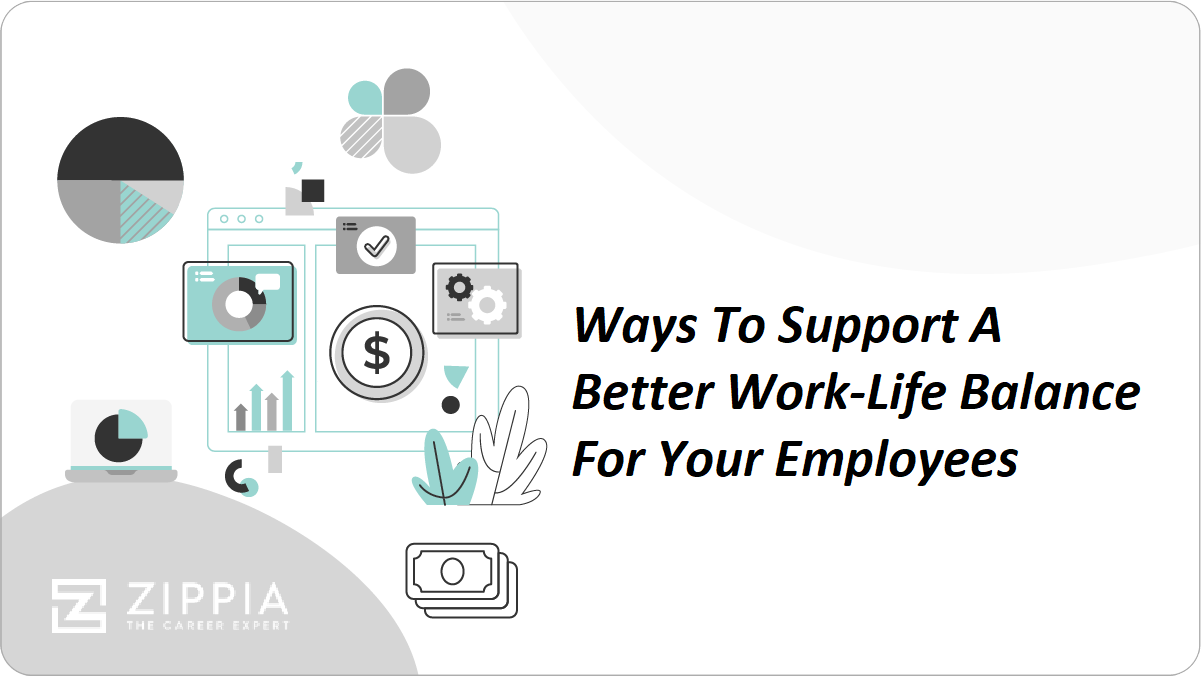Employees that have inconsistent schedules and are constantly being over worked tend to have a work-life imbalance. Overworked employees are more stressed and at risk of being burnt-out.
Supporting your employees work-life balance can help improve productivity, increase employee morale, and have higher retention rates.
To help you support a better work-life balance for your employees, we will go over what work-life balance is, some causes for an imbalance, and ways to improve it.
Key Takeaways:
-
More personal responsibilities such as a new house, marriage, and having kids can cause a work-life imbalance for employees.
-
Encouraging and respecting your employees time off of work can help them feel more relaxed and feel like you respect their personal time.
-
Having a better work-life balance can increase productivity, decrease health issues, and increase your employee retention and company reputation.
-
Being a leader when it comes to having a healthy work-life balance will encourage your employees to follow and implement the same work-life balance practices.

What is Work-Life Balance and Why it’s Important
Work-life balance is the process of maintaining the separation of success in your personal life and in your professional one. Sometimes finding time to balance the two can get tricky, especially with those who regularly work overtime, have long commutes, or have a lot of personal responsibilities outside of work. This can often lead to some employees feeling more stressed and more dissatisfaction with their job.
Having a positive work-life balance can have many positive effects sucks as lower stress levels, a lower risk of burnout, and a better feeling of success in your work. This not only benefits employees, but it also benefits employers and the company.
Causes of Work-Life Imbalance
Work-life imbalance can cause even the best employees to get stressed and hate their job. Here are some of the most common causes of work-life imbalance that your employees might be facing:
-
Rising expenses. Inflation and rising costs can cause most people to feel uneasy, especially when their wages don’t increase along with everything else. This can cause employees to feel stressed and feel the need to work more hours to make up some of those costs.
-
Personal responsibilities. Personal responsibilities can play a big factor in our work-life balance. If there is a big change in an employees life such as getting married, buying a house, or needing to care for a family member, can cause a work-life imbalance.
-
Unsupportive supervisors. Having a supervisor that doesn’t support their employees and their personal lives can make it challenging to manage work and personal responsibilities.
-
Increased work responsibilities. After a promotion or another employee quitting, some employees may face more responsibilities. This can lead to more stress for them from needing to work more.
-
Longer hours. If there are more responsibilities for employees, they may feel the need to work longer hours to get them done. This could also happen around the holidays when things are open longer to make up extra hours when the business is closed.
10 Ways To Improve Employee Work-life Balance
Here are 10 ways to help improve your employee work-life balance:
-
Acknowledge that every employee is different. It’s important to remind yourself that not everyone is able to work the same. One person may be fine working 60 hours a week and do the work of three people while another may struggle getting their assigned work done in the work week.
This also goes for when someone is the most productive during the day. Tailoring your approach to improve employee work-life balance to your employees will give you the best outcome.
-
Be flexible. Allowing employees a flexible schedule shows that you care about their lives outside of work. Allowing set open office hours for employees to come in when it’s best for them gives them the freedom of planning appointments or spending time with their families when it works best for them.
Offering remote-work for some employees that are unable to make it to the office can also be beneficial. Even offering remote days once a week or having remote weeks once a month can help employees improve their work-life balance better.
-
Lead by example. Modeling a proper work-life balance for your employees lets them feel more comfortable about doing it themselves. If they only see you working long hours and not taking your vacation time, they may thing you won’t approve when they want to work regular hours and take your vacation. Modeling this behavior for your employees will help them relax and spend more time on their lives outside of work.
-
Respect time off. When your employees are taking their time off, respect that and avoid contacting them during this time. Make it a company wide expectation that when someone is away from work, especially outside of working hours, they are not expected to communicate with other employees or manager and complete tasks outside of the office.
Doing this allows employees to feel relaxed and know that their time outside of the office is truly theirs and they don’t need to feel stressed.
-
Restrict employee hours. If you notice that employees are working long hours and staying late to get work done, try to restrict the hours they can work. By telling your employees that they aren’t able to work past 5pm on certain days lets them feel comfortable leaving the office and going home. This will decrease the chances of them getting burnout. Focus on the productivity of your employees over the amount of hours worked.
-
Get physical. Often times employees don’t have enough time in their day to be physical and exercise. Sitting down for too long can be fatal. Getting everyone up and moving during the day can help increase the blood flow and can help them be more productive. By walking to a new scenery can help improve creativity.
-
Hire more staff. If all of your staff have a large work load, it may be time to hire someone else to take some of that work. Having a full staff decreases the amount of work everyone has, allowing for a better work-life balance. If your company is not able to hire full time workers, employee temporary workers when needed. This could be during your busy season. Temporary workers fill in when needed allowing less stress on everyone else.
-
Take brain breaks. Having your employees step away from their work for a few minutes can help stress levels decrease. Have employees get in different group and have them solve a brain teaser. Focusing on something else for a few minutes can promote more creativity and productivity when it’s time to go back to the previous task.
-
Provide paid time off. Allowing your employees paid time off for illness, personal time or vacation time can increase their time away from work. Often times employees don’t want to take time off because they need the money. Allowing the paid time off gives them the freedom to take the time off when they are sick or want a vacation.
Along with offering with paid time off, allow for them to take unpaid time off for longer period of time. This could be for a sabbatical, needing to care for a sick family member, or even just an extended vacation. Allowing for your employees to take the time needed away from work will help them come back recharged and ready to work.
-
Offer unique job structures. Allow for your employees to share work and collaborate if needed. Also allow for employees to work part-time if they are struggling to manage their work-life balance. If an employee needs to take some time off for personal reasons, offer to keep them on as an on-call employee or on a as needed basis. This allows them to work when they can giving them time to sort out their personal needs without you losing a valued employee.
Benefits of Supporting Employee Work-life Balance
Supporting employees and their work-life balance can have many positive impacts for the company. Some of those benefits include:
-
Increased productivity. When your employees are well-rested and they are not stressed, it leads to higher productivity. Without extra work-loads, they are able to work their regular hours, meaning they are able to sleep more making them more well-rested and focused.
-
Less time off. Employees tend to take less time off when they have the time off the clock to get things done and rest.
-
Fewer health issues. An improper work-life balance means more health issues. When someone has a better work-life balance they have less fatigue and health issues. This leads to less sick days. Constantly working and improper work-life balance can lead to:
-
Increased neck and muscle discomfort
-
Unhealthy weight gain
-
Higher rate or alcohol consumption
-
Increased risk of heart-related problems
-
Higher on-the-job injuries
-
-
Fewer burnouts. Burnout is a form of mental exhaustion and a sign that your health at work isn’t ideal. Burnout can lead to more health issues and stress. If burnout goes on long enough, it can cause an employee to hate what they are doing and eventually quit.
-
Increased retention. When employers support their employees work-life balance, it can increase the retention rates for the company. They are less likely to leave when a company cares about them and their personal lives.
-
Improved company reputation. When employees are happy about their company, they will let everyone know. This can create a positive reputation for your company leading to more business and more people wanting to work for you.
-
Higher employee morale. Employees that are supported and well rested tend to have a higher morale. This helps create a positive work environment that improves employee satisfaction and collaboration.
14 Scientific Reasons To Disconnect At The Weekend
For more on the science behind why weekends are important for your employees (and for you too!), be sure to check out this infographic recently published by our friends at NetCredit.

- Improving A Culture
- How Volunteering Can Improve Company Culture
- How To Make Your Company Culture Thrive
- How To Support Work-life Balance
- The Cost Of A Bad Business Reputation
- The Benefits Of A Rooftop Garden At Your Business
- Why A Sustainable Greener Office Improves Productivity
- Reasons To Introduce Flexible Schedules
- How To Change Your Organizational Culture
- How To Change A Company Culture
- How To Implement A No-Meeting Day





